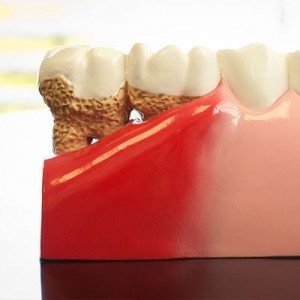Gum Disease (Gingivitis)

Gingivitis, the early stage of gum disease, occurs when the gums become inflamed, and is usually caused by plaque. Approximately 90% of adults suffer from gingivitis at some point in their life.
Gum disease, if left untreated, can spread to other parts of the body, increasing a patient’s odds of having a heart attack, stroke, and other serious medical problems.
Gingivitis is the most easily treated form of gum disease when caught early on, and it is reversible. It does not impact the surrounding tissue and bone, though.
Symptoms of gingivitis
- Inflamed gums
- Infection
- Tender, sensitive gums
- Gums that appear as a red or reddish-purple color
- Shiny gums
- Receding gums
- Gums that hurt when touched
- Gums that bleed easily when brushing
- Consistent bad taste in the mouth
- Consistent bad breath
- Mouth sores
If you have any of these symptoms, get checked right away by your dentist before bigger problems arise.
? What happens if you don’t treat gingivitis properly?
The simple answer: periodontitis. Periodontitis is the advanced, more severe form of gum disease, which produces more serious dental problems and health conditions. Actually, periodontitis can cause permanent tooth and jaw damage.
? What causes gingivitis?
- Trauma to the gums
- Irritating the rough edges of the teeth
- Plaque
Gingivitis is typically caused by plaque, which is the sticky film of bacteria on the tooth’s surface. It forms on a daily basis on the teeth, and reacts to the foods we eat. Plaque produces acids and toxins that can lead to tooth decay, which is why it is so important to brush and floss 2-4 times per day to remove the plaque.
If plaque is not removed in a timely manner, it hardens into tartar (or calculus). Tartar forms below the gumline and cannot be removed by brushing. This causes tooth decay and gum irritation at a faster rate than plaque. This inflammation and gum infection is called gingivitis.
Is it possible to prevent gingivitis?
Yes, you can greatly reduce the chances of gingivitis by:
- Brushing and flossing your teeth 2-4 times per day
- Quitting smoking and tobacco use
- Seeing your dentist for regular, six-month cleaning and examination appointments
Gingivitis treatment at Washington Smiles in Washington, Missouri
When you come in for your appointment, one of our dentists will perform a thorough evaluation of your teeth and ask about your symptoms. One of our hygienists will perform a thorough teeth cleaning above and below the gumline in a process called scaling. This process removes plaque and tartar. Scaling also smoothes the surface to minimize further irritation.
Don’t wait any longer to treat your gingivitis problem. Call us today to schedule your appointment!
